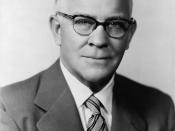A leading American playwright, Arthur Miller, b. New York City, Oct. 17,1915, has enriched the Broadway stage for several decades. Although Miller's dramas take place in familial settings, he has made a reputation for dealing with contemporary political and moral issues.Miller began writing plays while a student at the University of Michigan, where several of his dramatic efforts were rewarded with prizes. In 1937, during his senior year, one of his early plays was presented in Detroit by the Federal Theatre Project. In 1944 his The Man Who Had All the Luck won a prize offered by New York City's Theatre Guild. With his first successes--All My Sons (1947; film, 1948), winner of the Drama Critics Circle Award, and Death of a Salesman (1949; film, 1952), winner of both the Drama Critics Circle Award and the Pulitzer Prize--Miller condemned the American ideal of prosperity on the grounds that few can pursue it without making dangerous moral compromises.
Death of a Salesman, with its expressionistic overtones, remains Miller's most widely admired work. The keen social conscience evident in these plays has continued to manifest itself in Miller's writing. In the Tony Award-winning The Crucible (1953), for instance, he wrote of the witch-hunts in colonial Salem, Mass., and implied a parallel with the congressional investigations into subversion then in progress. The probing psychological tragedy A View from the Bridge (1955) questions the reasonableness of U.S. immigration laws. After the Fall (1964), which includes a thinly disguised portrayal of Miller's unhappy marriage to film actress Marilyn Monroe, offers a second, candid consideration of the congressional investigations in which Miller had been personally involved. Two one-act plays, Incident at Vichy (1964) and The Price (1968), deal with the universality of human responsibility and the guilt that often accompanies survival and success. Miller's...


